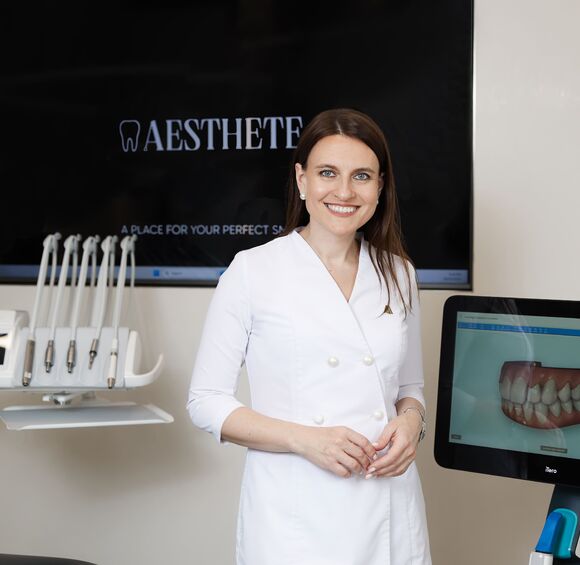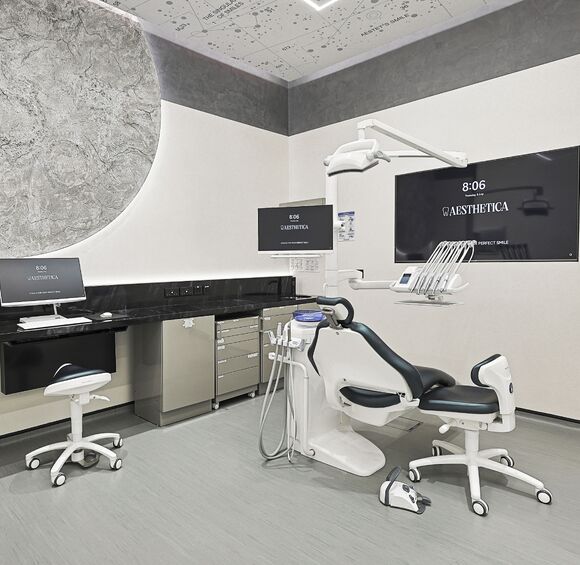Dental implantation is a complex procedure that must be performed strictly according to protocol. However, much also depends on the patient. After surgery, they must follow the doctor's recommendations. Non-compliance with these prescriptions, as well as medical errors, can lead to implant rejection. Here’s what you need to do to avoid this problem.
Implant Integration Norm
Implantation is a method of tooth restoration. It can be used to restore a single tooth, a section of the tooth row, or the entire row. The essence of the method is that dental implants – metal posts that serve as artificial roots – are implanted into the jawbone. Later, crowns will be installed on them, but it is crucial that the posts integrate successfully. Osseointegration, the process of integration, is divided into two stages. The early stage can last up to 6 months from the time of installation. During this period, new bone tissue forms between the jaw tissue and the implant. Initially, it is soft and spongy but gradually hardens, providing better support for the post. If all goes well, the doctor will load it with a crown. The late stage lasts from 6 to 24 months, on average up to a year and a half. During this stage, the implant fully fuses with the jawbone. If osseointegration is successful, the post and the crown installed on it become part of the dental system. Several factors influence the likelihood of integration:
- the material from which the implant is made;
- the specifics of the artificial root's surface treatment;
- the price category of the post;
- the condition of the patient's jawbone;
- the qualification of the doctor and how well they followed the protocol during installation;
- the patient's adherence to the doctor's prescriptions after implantation.
The average implant success rate is 95-96%. For premium-class solutions, it reaches 99-100%. But this is provided that the doctor has done a good job and the patient has strictly followed their recommendations.
What does implant rejection mean?
In a broad sense, rejection refers to any situation where the patient loses the installed artificial root. To reduce the likelihood of such an outcome, manufacturers:
- make posts from hypoallergenic materials – titanium and its alloys;
- specially treat their surfaces to increase the contact area between the implant and the jawbone.
Despite this, the following situations are possible:
- Non-integration, meaning the installed post does not fuse with the jawbone. This is extremely rare. The problem can be detected using an X-ray. Non-integration is usually identified during a control scan before the crown is installed.
- Peri-implantitis, an inflammatory process affecting the bone tissue around the implant site. This can occur even if the post has successfully integrated. The cause of peri-implantitis is bacterial activity entering the gap between the gum and the artificial root. The bone gradually deteriorates as a result. If treatment is not started in time, the implant can fall out.
Statistics show that peri-implantitis occurs in about 3% of cases. The development of inflammation does not depend on the quality of the metal post or its category.
Causes of Dental Implant Rejection
All the various causes leading to rejection can be divided into two groups: due to the doctor and due to the patient.
Due to the Doctor
The dentist can make the following mistakes:
- Conduct insufficiently thorough preparation for the operation. There is a chance that the doctor may mistakenly assess the density and volume of bone tissue. In this case, the post will not hold, and bone grafting surgery will be needed to correct the error.
- Use poor-quality implants. This problem usually arises when the clinic wants to save money. Sometimes doctors give in to patients with limited budgets. When low-quality posts are used, scar tissue instead of bone tissue forms, which cannot hold the artificial roots.
- Violate installation rules. The surgeon may damage the facial nerve in the lower jaw area or the floor of the maxillary sinus located above the upper jaw. They may make a hole that does not match the size of the implant or overheat the bone.
- Violate the prosthetic protocol. For example, inflammation of the soft or hard tissues surrounding the implant site can be caused by dental cement getting under the gum.
- Install the crown too early – this happens with express implantation.
Due to the Patient
After implantation, it is essential to strictly follow the doctor's prescriptions. Non-compliance increases the risk of rejection. The following causes can lead to negative consequences:
- Smoking – nicotine in tobacco smoke narrows blood vessels. Tissue blood circulation worsens, the bone and soft tissues weaken, and cannot hold the implant.
- Insufficient or improper oral care. It is important to brush your teeth thoroughly to prevent plaque buildup. Plaque serves as a nutrient medium for bacteria that cause caries, pulpitis, peri-implantitis, and other diseases. It is advisable to undergo professional cleaning at the clinic twice a year.
- Untimely treatment of diseases. Due to the weakening of the body caused by illnesses, problems with the condition of the metal posts can also arise.
Rejection of the artificial tooth root can also result from trauma, an individual allergic reaction that was not identified before installation.
Symptoms and Signs of Dental Implant Rejection

Rejection manifests as follows:
- The installed metal post moves. This indicates that the osseointegration process is not completed and is unlikely to result in a positive outcome.
- The patient experiences acute pain that does not subside within a week.
- Pain occurs when pressing on the artificial root or the area around it.
- The gum becomes inflamed – such inflammation is considered normal after surgery if it subsides by the fourth day post-operation.
- An unpleasant smell emanates from the cap placed on the post.
- Pus is discharged from the gum, which may also be accompanied by an unpleasant smell.
- Blood flows from the postoperative wound, and the bleeding does not stop within a week.
- Body temperature rises.
Many of the listed symptoms are similar to those experienced by the patient shortly after surgery. However, they should gradually weaken, especially after taking painkillers, anti-inflammatory, and anti-edema medications prescribed by the doctor. Therefore, it is important to monitor your condition carefully. If the unpleasant sensations not only persist but intensify, you should see a dentist as soon as possible. You should also inform the doctor if such symptoms arise long after implantation when postoperative pain has long passed. For example, painful sensations that cannot be relieved with medication likely indicate peri-implantitis. Prolonged numbness of the operated area may indicate facial nerve damage. While this does not increase the likelihood of implant rejection, it is an unpleasant consequence for other reasons.
How Does Dental Implant Rejection Occur?
The cause of the problem and the method of resolving it largely depend on the stage at which the rejection occurs. Most cases occur during the early (up to 6 months) or late (6 to 24 months) stages of integration. Rejection two years after implantation is very rare.
Regardless of how much time has passed since the implant installation, you should consult a doctor. They will assess the condition of the dental system and the metal post, and determine whether re-implantation is needed or if the issue can be resolved in another way.
Signs of Early Stage Rejection
On the second or third day after the surgery, you need to go for a follow-up check-up with the dentist. The dentist will check how well the healing is progressing, assess the stability of the implant, and the condition of the surrounding tissues.
Pain at the implant site, swelling, slight inflammation, and edema are natural reactions of the body to surgery. These symptoms should gradually subside. If the adverse effects persist on the 3rd or 4th day, complications are likely. If they have not subsided within a week, implant rejection can be confidently diagnosed. However, only a doctor can make the final diagnosis. In rare cases, prolonged pain, suppuration, and inflammation after surgery can be an individual reaction of the body.
Signs of Late Stage Rejection
These symptoms are similar to those experienced by the patient in the early stages. However, in this case, they are difficult to confuse with the normal reaction of the body to surgery because months or even years have passed since the installation.
The first sign that clearly indicates rejection is the mobility of the artificial tooth, meaning the post does not hold in the jawbone.
Other signs include:
- Constant or pressure-induced pain in the implant area.
- Gum inflammation, often accompanied by swelling.
- Bleeding from the gum.
- Increased body temperature, often combined with fatigue and a feeling of weakness.
How to Avoid Rejection?
The likelihood of integration largely depends on the price category of the implant. It is better to use premium-class solutions. They are more expensive, but the probability of successful osseointegration is 99-100%.
Such a result can be achieved if the implantation is performed by an experienced dental surgeon who strictly adheres to the technology and protocol. Therefore, gather more information about the doctor who will work with you. Learn about their education, qualifications, and read reviews on the clinic's website and independent platforms.
Follow all the doctor's prescriptions. Immediately after the surgery, you need to:
- Refrain from smoking and alcohol consumption.
- Exclude hard foods, overly hot and cold foods from your diet.
- Avoid overheating and hypothermia.
- Rinse your mouth with antiseptic solutions.
- Do not disturb the operated areas.
Throughout the entire period of implant use, it is important to maintain proper oral hygiene. You should brush your teeth with a brush of the appropriate hardness, use interdental brushes, dental floss, and an irrigator for particularly thorough cleaning of interdental spaces.
Monitor your health, treat diseases in a timely manner, and avoid jaw injuries.
If you feel mobility of the post, pain, or discomfort in the area of the artificial root, consult a doctor as soon as possible.
What to Do if Implant Rejection Begins?

Symptoms indicating rejection can be either pronounced or mild. Do not wait for the situation to worsen. Inform your dentist about the problem as soon as you notice it and do not delay your visit to the clinic.
Even if the symptoms you are experiencing are not related to implant rejection, visiting the medical center will be beneficial. The doctor may identify other problems that need to be addressed.
The further course of action depends on the specific situation.
- Local or systemic conservative treatment without removing the implant: It is necessary to reduce inflammation and eliminate suppuration. Usually, the doctor prescribes tablets or injections. This is sufficient if the inflammatory process has only affected the soft tissues and the jawbone is not atrophied.
- Removing the artificial root, treatment, and installing a new post: This option is often used if the bone tissue is damaged. Bone grafting may be needed, which extends the treatment duration, and the new implantation can be performed, for example, in a year.
- Removing the implant without replacement and undergoing therapy: It may be possible to place the artificial root in another location. If this is not feasible, the dentist will suggest another method of tooth row restoration.
The sooner the patient seeks help, the higher the chances of saving the implant. However, the final decision is made by the doctor based on the diagnostic results.
When Can a New Implant Be Installed for Free Under Warranty?
During the implantation procedure, two types of guarantees are provided:
- On the implant itself: Depending on the manufacturer, this warranty can last 10, 15, 20 years, or even be lifetime. However, this is conditional on the implant being installed in full compliance with the protocol and the patient following the dentist's recommendations.
- On the work: This warranty is provided by the clinic and lasts 1-5 years. It covers cases where rejection is caused by a medical error.
If problems arise, you can try to get a new implantation service for free. However, you need to provide strong evidence to support your case. If it is found that the rejection occurred due to the patient's fault or for reasons beyond the control of the manufacturer or clinic, the free installation of implants will not be provided.
It is also important to understand that, legally, it is impossible to guarantee the results of surgical intervention. Replacement and reinstallation of artificial roots are usually done because manufacturers and medical centers prefer to resolve conflicts amicably to protect their reputation.
Prevention
Reducing the likelihood of implant rejection is possible by contacting a well-equipped clinic with experienced and highly qualified doctors. The AESTHETE clinic fully meets this requirement.
Preparation for implantation is necessary. It is important to inform the dentist about health issues and possible contraindications. The doctor will ask questions, and you should answer them informatively without hiding anything.
Before installing artificial roots, you need to:
- Treat caries and other dental and gum diseases.
- Eliminate all inflammation foci in the oral cavity.
- Undergo professional cleaning to remove soft plaque and hard deposits on tooth enamel.
The doctor ensures that the patient undergoes the necessary preparatory measures. However, it is also important to control this process yourself. If you have questions, you should ask them.
After implantation, you must strictly follow the doctor's prescriptions and attend follow-up visits according to the schedule. If you cannot visit the clinic at the appointed time, call and reschedule the appointment. Do not disappear without notice.
If you experience symptoms that may indicate implant rejection, contact your doctor as soon as possible. The sooner they diagnose and propose a solution, the easier it will be to correct the situation.
The AESTHETE dental clinic is located in Dubai (UAE), Bluewaters Island. The high qualifications and extensive practical experience of our staff enable us to provide implantation services at an impeccable professional level. Our doctors will accurately assess the condition of the patient's dental system, install implants strictly according to the protocol, and remind you of the need to follow the prescriptions to avoid potential rejection of the artificial roots and achieve excellent results.
The clinic administrators are ready to answer your questions. They will provide information about service prices, help you find a convenient time to visit the dentist, and schedule a consultation.
Referense
- Shulman, L. B.; Driskell, T. D.. Implants in Dentistry. Philadelphia: W. B. Saunders; 1997. Dental Implants: A Historical Perspective.
- Galagali, G.; Srinivas Reddy, E.; Nidawani, P.; Behera, S. P.; Preetham, P.; Sarpangala, M.. Implant failures: a comprehensive review. International Journal of Preventive and Clinical Dental Research , 2014, 1(1–3): 11–17.
- Kate, M. A.; Palaskar, S.; Kapoor, P.. Implant failure: a dentist’s nightmare. Journal of Dental Implant , 2021, 103–130.















